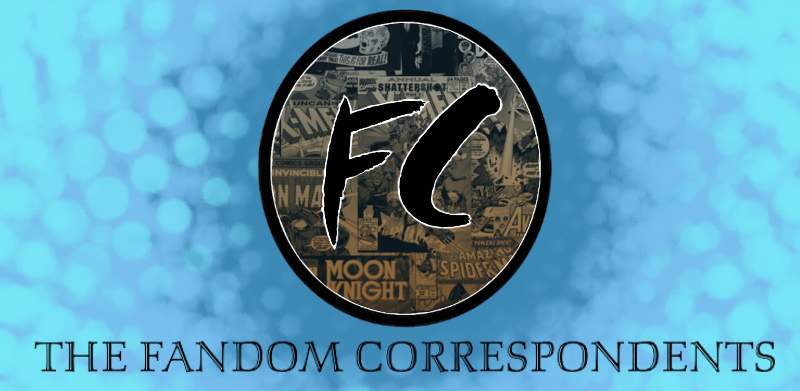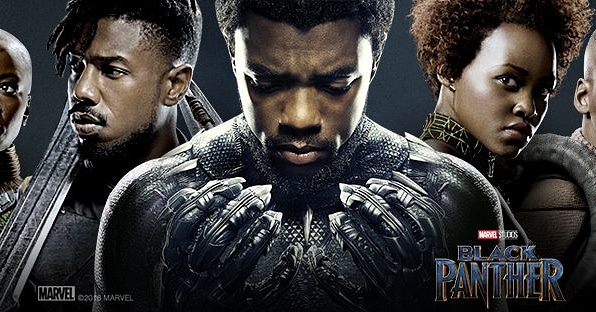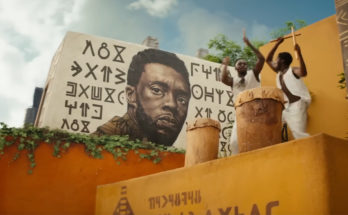Let me start by saying that I am fully self-aware. Of all the voices out there contributing to the discussion about race in comic book entertainment, mine is coming from a place of privilege and lacks the potential richness of an African or African-American writer’s experiences and insight. And I encourage each and every one of you to seek out such writers for their opinions and input, for they can provide much more context, cultural significance, and quality than I could ever hope to provide on this subject. That being said, I humbly hope that my writing this review can contribute some small piece of unity and brotherhood in the larger scheme of things, even if I only inspire one person to reconsider black culture and entertainment to see the inherent value and unique perspective that such creators, entertainers, and philosophers can offer.
I loved Black Panther. Let’s just get that preliminary opinion out of the way; I loved everything about it, and it is currently a contender for my favorite Marvel movie along with Spider-Man: Homecoming and Guardians of the Galaxy 2. Black Panther’s director Ryan Coogler has masterfully blended comic book faithfulness, cross-cultural relations, social commentary, and modern artistic filmmaking into a final product that is every bit as good as audiences were hoping it would be. I say with no trepidation that years from now, society will look back on Black Panther and recognize as a turning point, not just for comic book entertainment, but also for racial, cultural, and gender diversity in Hollywood as we move forward in a time of great change and progression in the entertainment industry.
For the first part of this review, I will talk about the movie in spoiler-free terms and offer some opinions on its cultural significance. Then, I will bring up some major spoilers in my discussion about the film’s finer points of detail. The warning for spoiler content will be clear, so feel free to read ahead in confidence that nothing will be spoiled for the next few paragraphs.
Black Panther is phenomenal for several reasons. For Marvel films, it offers the strongest developed villains that we have ever seen and offers the greatest cast diversity in comic book movies as a whole. With perhaps the exception of Daredevil and Luke Cage, Black Panther has the strongest cast that Marvel has ever assembled. From Chadwick Bosman being born for the role of T’Challa to offering Danai Gurira a chance to flex her acting prowess from the emotional oppression of The Walking Dead, from Andy Serkis presenting a despicable yet somehow enjoyable villain to establishing Letitia Wright as one of the greatest young acting talents in the industry, every single member of the cast poured their heart and soul into their roles. Every second that Bosman and Jordan were on screen together was intense, not enough can be said about Lupita Nyong’o’s ability to steal every scene from such greats as Martin Freeman and Angela Bassett. Even smaller-scale actors like Winston Duke and Daniel Kaluuya added depth and realism to every scene they were in and really made Wakanda feel like a real place with its own culture and value.
Also, I cannot understate Coogler’s excellent use of humor throughout the film. There are some great laughs throughout the script, but it never feels overused like it did in Thor: Ragnarok, a movie that while great in its own right never let any serious moment breathe without squeezing in a one-liner. You could tell that the creators wanted to do something special with this movie, and while it was still comically enjoyable, it was easy to be emotionally invested in every scene. The humor was a complement rather than a theme, and that was a refreshing change of pace for a cinematic universe that’s been criticized at times for being too witty to take seriously.
Black Panther is also easy to jump into for non-comic book fans. While Marvel fans can definitely appreciate several references to other Marvel movies and the comics, Black Panther’s narrative is friendly to newcomers. One can quickly become familiar with the characters and events by simply watching the movie’s first act, and such accessibility is essential to a movie genre that prides itself on world-building. The man sitting next to me in the theater commented to me that this was his first Marvel movie he had ever watched, and by the end he was just as invested in the characters and plot as I was.
Finally, the main thing that impressed me about Black Panther was how it handled social commentary. As soon as advertisement for Black Panther began, people knew that this was not just another superhero movie. For many people, it was the first entry into the superhero genre that featured a black protagonist and mostly black cast while still operating with the same budget as other Marvel and DC projects. Yes, Luke Cage had already come out, but this was the silver screen. And with how race relations in the US and abroad have been developing over the years, this was Marvel and Ryan Coogler’s opportunity to not only portray a character for an underrepresented demographic but also to offer a social analysis and commentary that wasn’t going to shy away from sensitive topics. And they absolutely nailed it. During the course of the film, such themes as prejudice, cross-cultural identity, refugee crises, international relief, internalized and institutionalized racism, public unrest and disruption, and political corruption were portrayed, discussed, and cross-examined without ever feeling preachy. Black Panther’s writing did us all a favor by presenting these issues in a digestible way, proving that yes, it is possible to have these discussions civilly and creatively. Black Panther was not a great movie because it portrayed a black superhero; it was a great movie because it offered us a hero who was relatable in new ways to new people that can improve comic books and social discourse in ways we have never seen before. In addition to the racial and cultural diversity it offered, the movie also established several strong female heroes and role models. As a kid, I would watch Spider-Man hundreds of times and be inspired by his heroism and unabashed devotion to good. Now, it makes me happy that black children have a similar hero they can look up to that the world had so unfairly made unavailable for so long. Superheroes are for everyone, and Black Panther makes that statement truer than it ever was before.
OK EVERYONE THIS IS WHERE SPOILERY STUFF IS GOING TO BE DISCUSSED. IF YOU HAVEN’T WATCHED THE MOVIE THEN STOP READING NOW, OK?? IF YOU DON’T AND YOU GET SPOILED THEN DON’T COME CRYING TO ME, YOU STUPID, STUPID MORON. OK LAST WARNING. WE GOOD? OK. COMMENCE SPOILERY TALK.
Holy crap, Killmonger was everything I hoped he would be and more. Michael B. Jordan portrays a more passionate villain than we have ever seen in Marvel with the possible exception of Fisk in Daredevil. Without exception, he has the most sympathetic motivations to begin the movie with: his father was killed, betrayed by his homeland, and he was abandoned by his people. He sees his fellow black people all over the world suffering from oppression and disaster, and he wants to use his birthright to end that suffering and lift his people up. In many ways, he is an excellent reflection of T’Challa: both are confronted by the suffering of their people worldwide, and both are searching for a way to use their power and influence to help them. However, Jordan’s character comes to a very different conclusion, and in his rage that sympathy he felt for others transforms into bloodlust and thirst for revenge. Conversely, T’Challa is confronted by such rage from Eric that it moves him to help others as well, only instead with peace and empowerment rather than conflict. I have seen a lot of parallels being drawn between Killmonger and Malcolm X, and I would like to make a distinction there: while Malcolm X definitely advocated for violent methods early in his civil rights career, it is important to remember that for the latter majority of his life, he softened his approach and supported very similar causes and methods that Dr. King encouraged. In reality, T’Challa himself is much more of a blend of Malcolm and King than Eric is, for he strives to balance power with compassion and advocates for the empowerment of black people with the temperance of unity with all people. The two characters are woven beautifully into the history of civil rights, and it is important to recognize where one begins and the other ends. After all, when Stan Lee and Jack Kirby first created the character in 1966, the name choice Black Panther was anything but accidental. To his last breath, Eric values solidarity with his people over enslavement and oppression, and that makes him one of the most complex and, in my opinion, beautifully written characters we have ever seen.
Coogler’s use of cinematic storytelling is a joy to watch. The main piece that sticks out to me is when Eric first ascends to the throne and the camera view is upside down, displaying the radical and chaotic change that is about to shape Wakanda. The costumes and sets were beautiful and displayed the rich beauty of African culture as well as the creativity of Black Panther’s crew. They were able to portray Man-Ape as a primal warrior steeped in tradition and honor when few creators would have even attempted to handle the character, displaying the team’s creative vision and expert world-building. The visual presentation combined with Kendrick Lamar’s masterful music production brought Wakanda to life and created an immersive experience that I can’t wait to relive.
Black Panther was simply phenomenal. It was emotional, action-packed, expertly written, and beautifully produced. The acting talent was astronomical, and Coogler handled social issues with more grace and boldness than any other director in the business could have hoped to. But at the end of the day, this movie is not just good, it’s significant. With the combined racial diversity, cultural richness, and gender empowerment, Black Panther is a movie that has the ability to change entertainment for years to come and draw entirely new demographics to comic books. It enables us to have important but difficult conversations about race and politics while inspiring us to reach for a standard of equality and cooperation that can only be inspired by superheroes. Infinity War will be Marvel’s prime event, but years from now we will look back on Black Panther as the movie that truly did change comics forever.


